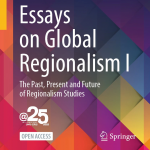Review: GREMLIN Roundtable and Workshop

Over the past few years, trade policy and trade agreements have raised stormy debates in Europe and the United States, whether they pertain to the employment effects of Chinese imports, TTIP’s threat to Europe’s precautionary principle or Donald Trump’s protectionist moves. The GREMLIN Project, in cooperation with the European Network on Inclusive Approaches to Trade Policymaking (ENIATP), coordinated by the Sorbonne Nouvelle University in Paris, organized a roundtable and workshop, hosted by UNU-CRIS on October 4 & 5. These two events brought together a group of international experts to analyze the increasingly-questioned legitimacy of trade policymaking and examine the multiple forms of exclusion in the trade sphere, as well as the potentialities of inclusive approaches such as multistakeholderism.
On the fifth of October, researchers from the GREMLIN and ENIATP networks gave presentations that will feed into the preparation of a special issue of a reputable peer-reviewed journal. They discussed a range of issues, from civil society inclusion, to the privatization of public services, to the role of sub-state actors in large-scale regional trade deals. The overall discussion focused on new research trends in the political economy of trade. The presenters articulated a multifaceted understanding of the nexus between trade, exclusion and inclusion, and dealt with these issues from a comparative and interdisciplinary perspective. The participants identified and addressed three understudied determinants of exclusion in trade policymaking: 1) cognitive and emotional factors; 2) policy processes and institutional mechanisms; 3) multiscalar dynamics. These will form the core of future developments as the work towards delivering finalized articles continues.




